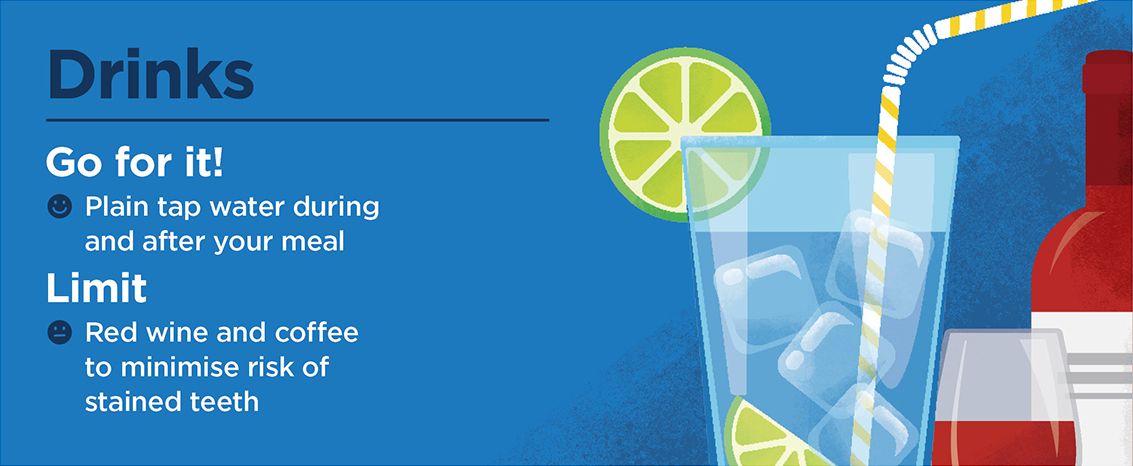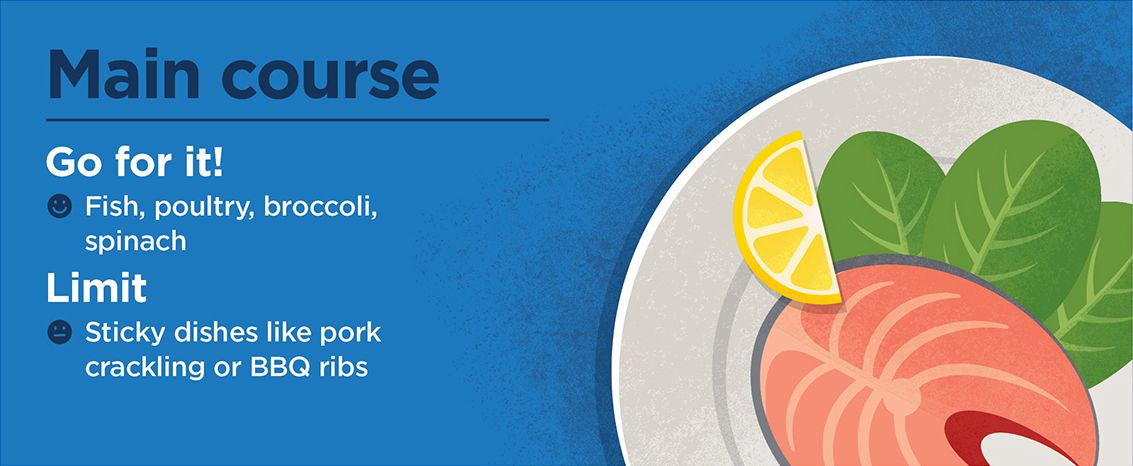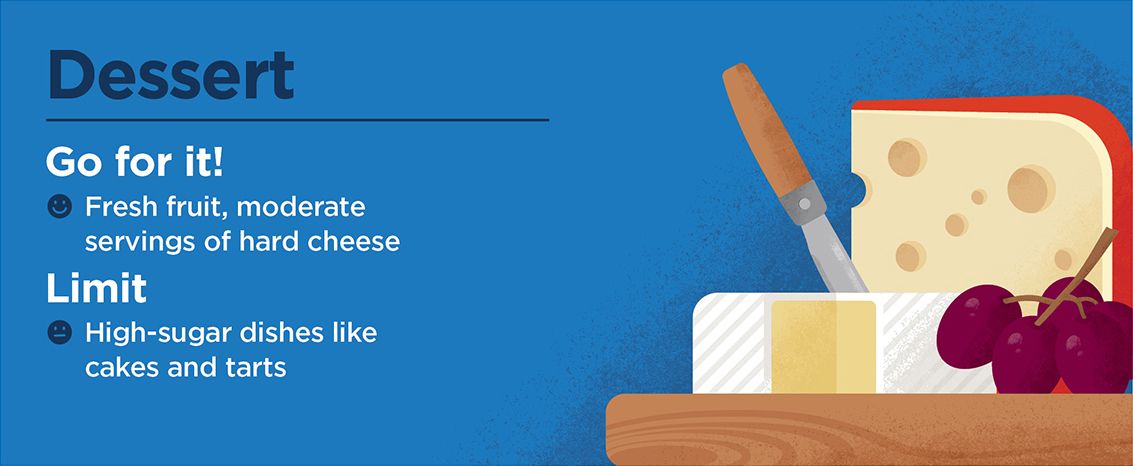Your food and beverage choices can affect many aspects of your health, not least your oral health. Tooth decay and gum disease are some of the common health issues in Australia, and your food choices can have a significant impact on both.
That's why it's useful to know some general tips before you make your menu choice. From lowering your risk of tooth decay to minimising chances of stains or bad breath, here's a quick guide to some healthier options when you're eating out.
Drinks
When eating out, we often think about which drinks pair well with certain dishes – but how often do we think about which drinks could be healthy for our teeth? Excessive consumption of sugary or acidic drinks can contribute to tooth decay and dental erosion, while red wine, tea and coffee could be the reason behind teeth stains.
You may already know that sugary soft drinks can encourage tooth decay by feeding bacteria in the mouth, but you might not know that some sugar-free options and fruit juice may not be good either. That's because most carbonated drinks and fruit juices are usually high in acid, which can cause the outer layer of your teeth (the enamel) to wear down over time. This may make them more prone to cavities and other damage.2
This problem may also be applicable to acidic alcoholic drinks, along with other health risks associated with alcohol. The national guidelines for alcohol consumption recommend limiting to no more than two standard drinks on any day to help reduce the lifetime risk of harm from alcohol-related disease or injury.10
“Many alcoholic drinks are acidic,” explains Dr Kasey Watson, principal dentist at Bupa Dental Chatswood. “If you do drink alcohol, try sipping tap water before and after. Be cautious about brushing your teeth too quickly afterwards - aim to wait a minimum of half an hour.”
Red wine, tea, coffee and other pigmented drinks usually contain chromogens, which are substances that can stick to your teeth and cause stains.4 Alcoholic and caffeinated drinks can also dry out the mouth and reduce saliva, which can increase the risk of tooth decay and gum disease. Along with broader health risks, drinking too much alcohol has also been linked to an increased risk of oral cancer.3
One of the best drinks for teeth is plain water, especially fluoridated tap water that can help to strengthen teeth enamel. Even if you choose another drink, it's recommended to take sips of water in-between to help rinse your mouth and prevent stains or plaque.2
Bottom line. To minimise the risk of tooth stains, limit drinking red wine and coffee. Minimise sugary and carbonated beverages to help cut your risk of tooth decay, dental erosion and gum disease. Sip plain water between the drinks, and avoid brushing your teeth immediately after drinking acidic beverages like alcohol or fizzy drinks.

Salad
The right type of salad can be a great option for a number of reasons, including the health of your teeth, gums and mouth. Leafy green vegetables are a good source of calcium and other nutrients that are important for maintaining dental health.1
Calcium is the primary mineral of teeth and bones, and eating calcium-rich food helps to keep them strong. Veggies such as carrots can contribute vitamin A, which also helps to form teeth enamel, while foods such as tomatoes and bell peppers contain vitamin C that supports healthy gums.6
Just be aware of what else is in the salad – or on top of it. For instance, salad toppings such as dried fruit are high in sugar and may stick to the surface of your teeth.
Bottom line. Chomp down on leafy greens for helpful nutrients, but be wary of any salad ingredients that are sticky, sugary or acidic.
Main course
Whether you prefer red or white meat or you're a vegetarian, be on the look-out for tooth-friendly options.
Meat, poultry, fish and eggs are good sources of protein as well as phosphorus, one of the most important minerals in the body that helps to absorb calcium.6
Vitamin D helps regulate the absorption of both calcium and phosphorus, which are important for healthy teeth and bones. While natural sunlight is the primary source of vitamin D, some foods such as fish can provide some amounts of vitamin D.6,7
In addition to the meat and fish sources, some vegetables can also help provide these nutrients. As well as contributing vitamin A and vitamin C, the high water and fibre content of many veggies can help clean the teeth, especially crunchy vegetables that stimulate saliva production and can scrub away trapped food on teeth surfaces. Dark green veggies like broccoli and spinach are also good sources of calcium.1
Bottom line. Choose main course options that are rich in tooth-friendly nutrients such as calcium and phosphorus; fish, poultry, and crunchy veggies could be good options!

Cheese
Cheese is high in fat but it’s also rich in calcium, protein and other important nutrients.1 Research suggests that hard cheese may help to fight tooth decay by stimulating saliva production during chewing and help neutralise the acids produced by plaque.8
Cheese boards often include nuts, dried fruits and fruit spreads. While some nuts, particularly almonds, can be a good source of calcium, be mindful of the significant sugars in some dried fruit which can stick to the teeth, making it difficult to remove.1,2
Bottom line. While it’s high in fat and its portion size should be moderated, cheese is a good source of calcium. Eating hard cheese may benefit teeth by neutralising acids and promoting saliva production.
Dessert
If you've got a sweet tooth, eating your favourite desserts and sweet treats as part of a larger meal may do less damage than between-meals snacking.9
“Every time you have that sugar intake, the bacteria will get a chance to produce acid,” explains Dr Fadi Yassmin, who leads Bupa Dental Broadway as the principal dentist. “Have the treat, knock yourself out, then drink or rinse with some water straight after. You’re better off if you do that than frequently consuming sugar throughout the day.”
It's still a good idea to limit eating cakes and other sugary desserts, as these usually have few to no nutritional benefits. Fresh fruit tends to be a good alternative to sweets, and a piece of reduced-fat hard cheese may be a tooth-friendly option for topping off your meal.
Bottom line. Consider swapping a sugary dessert for some fresh fruit or even sharing a cheese board with the rest of your table. If you do opt for a sugary dessert, make sure you drink or rinse your mouth with plain water afterwards.
Gum
A big meal can be satisfying but might leave you worried about your breath, especially if you’ve had foods such as garlic bread! Chewing gum can help, but aim for the sugar-free variety. Along with minimising bad breath, chewing sugar-free gum for about 20 minutes can promote saliva production. This can then help to remove trapped food and plaque from your teeth and may neutralise decay-causing acids.9
Bottom line. Chewing gum can be a good way to dislodge food debris, minimise odours and promote saliva production. Aim for sugar-free gum.
Caring for your dental health: what else?
Even when you're watching what you eat, it's still important to keep up a good oral hygiene routine of brushing, flossing and regular dental visits. Your dentist can offer more advice about teeth-friendly food and drinks so you can look out for your teeth - even when you’re eating out!

1 American Dental Association. Nutrition: What You Eat Affects Your Teeth Online 2012 Accessed June 2018 Available from: www.mouthhealthy.org
2 American Dental Association. Top 9 Foods That Damage Your Teeth Online 2013 Accessed June 2018 Available from: www.mouthhealthy.org
3 Cancer Council. Alcohol. Online 2018 Accessed June 2018 Available from: www.cancer.org.au
4 Australian Bureau of Statistics. Australian Health Survey: Consumption of added sugars, 2011-12 Online 2016 Accessed June 2018 Available from: www.abs.gov.au
5 American Dental Association. Whitening: 5 Things to Know About Getting a Brighter Smile Online 2015 Accessed June 2018 Available from: www.mouthhealthy.org
6 Ontario Dental Association. Food & Your Teeth Online 2008 Accessed June 2018 Available from: www.youroralhealth.ca
7 Dental Health Services Victoria. Food and drink for healthy teeth Online 2018 Accessed August 2018 Available from: www.dhsv.org.au
8 Nutrition Australia. Cheese. Online 2018 Accessed June 2018 Available from: www.nutritionaustralia.org
9 Australian Dental Association. Diet and Nutrition Online 2018 Accessed June 2018 Available from: www.ada.org.au
10 Australian Government. National Health and Medical Research Council. Australian Guidelines to Reduce Health Risks from Drinking Alcohol Online 2009 Last updated March 2018, accessed September 2018 Available from: www.nhmrc.gov.au